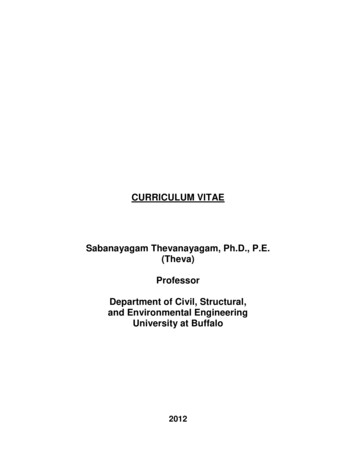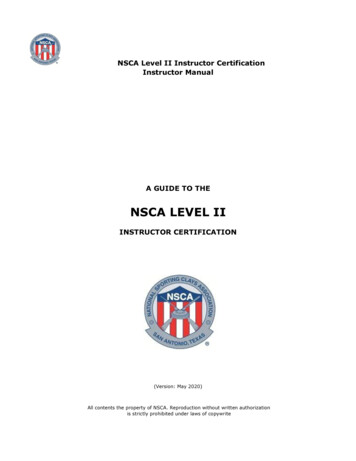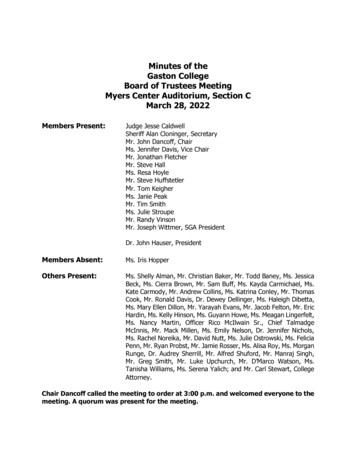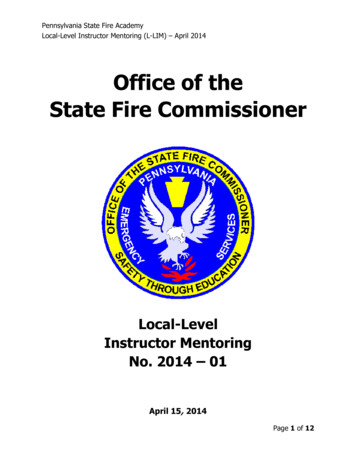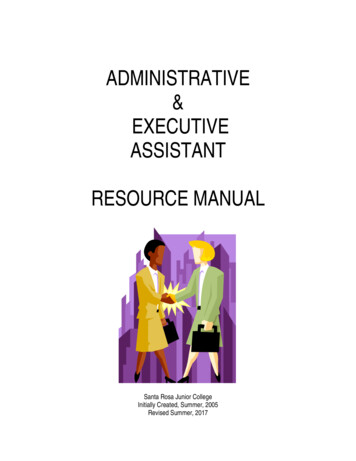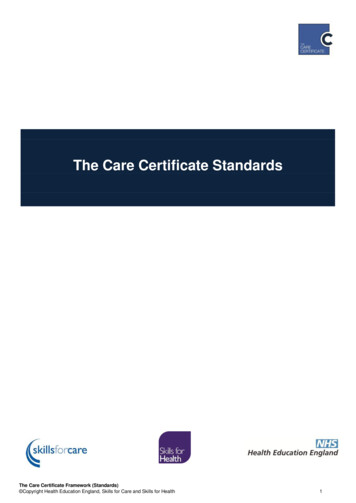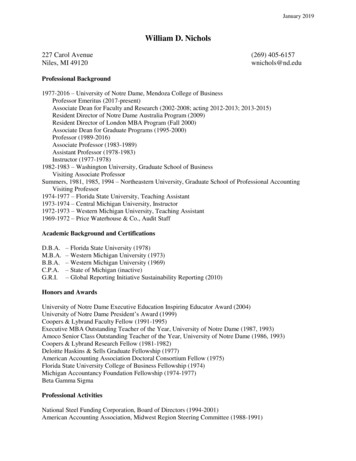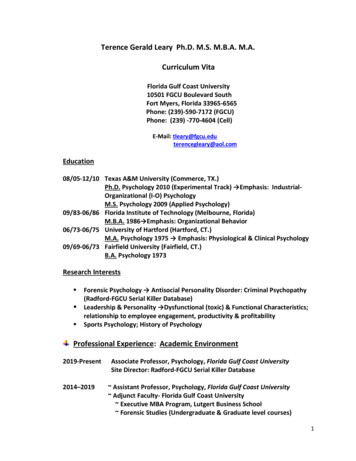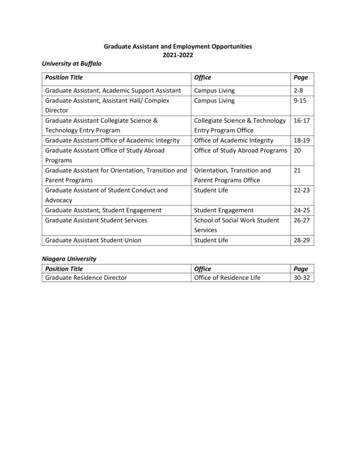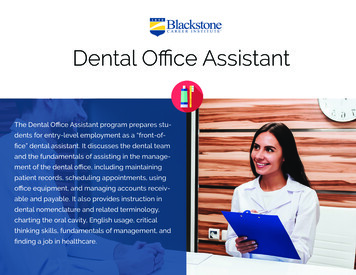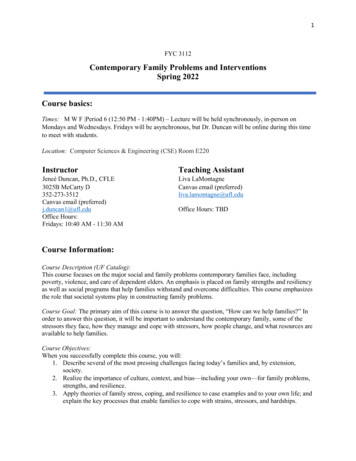
Transcription
1FYC 3112Contemporary Family Problems and InterventionsSpring 2022Course basics:Times: M W F Period 6 (12:50 PM - 1:40PM) – Lecture will be held synchronously, in-person onMondays and Wednesdays. Fridays will be asynchronous, but Dr. Duncan will be online during this timeto meet with students.Location: Computer Sciences & Engineering (CSE) Room E220InstructorJeneé Duncan, Ph.D., CFLE3025B McCarty D352-273-3512Canvas email (preferred)j.duncan1@ufl.eduOffice Hours:Fridays: 10:40 AM - 11:30 AMTeaching AssistantLiva LaMontagneCanvas email (preferred)liva.lamontagne@ufl.eduOffice Hours: TBDCourse Information:Course Description (UF Catalog):This course focuses on the major social and family problems contemporary families face, includingpoverty, violence, and care of dependent elders. An emphasis is placed on family strengths and resiliencyas well as social programs that help families withstand and overcome difficulties. This course emphasizesthe role that societal systems play in constructing family problems.Course Goal: The primary aim of this course is to answer the question, “How can we help families?” Inorder to answer this question, it will be important to understand the contemporary family, some of thestressors they face, how they manage and cope with stressors, how people change, and what resources areavailable to help families.Course Objectives:When you successfully complete this course, you will:1. Describe several of the most pressing challenges facing today’s families and, by extension,society.2. Realize the importance of culture, context, and bias—including your own—for family problems,strengths, and resilience.3. Apply theories of family stress, coping, and resilience to case examples and to your own life; andexplain the key processes that enable families to cope with strains, stressors, and hardships.
24. Define and compare types of family interventions and apply family interventions appropriately tofamily examples.5. Develop relevant professional skills: Manage assignments to meet set deadlines; follow ethicalguidelines; continue to develop writing skills; build critical thinking skills; advancecommunication and interpersonal skills; apply resilience skills for your own self-care.Prerequisites:Because the information that we will be covering assumes that you already have certain knowledge, it isimportant for you to have already taken the following courses:FYC 3001 Introduction to Family, Youth and Community SciencesSYG 2000 Principles of Sociology, AND eitherSYG 2430 Marriage and the Family OR FYC 3101 Parenting and Family DevelopmentYou also must be classified as a junior or senior and must be a major or minor in FYCS. If you do notmeet these prerequisites, please contact the instructor.Required Textbook:Price, C.A., Bush, K.R., & Price, S.J. (2021). Families & change: Coping with stressful events andtransitions, Sixth edition. Thousand Oaks, CA: Sage Publications.Other Readings:Supplemental reading assignments will be provided by the instructor through the class’s Canvas site.Streaming:Movie/show clips from streaming services (i.e., Netflix, Hulu) will be either shared in-class or will be partof online activities. If I assign a clip for an assignment, you are not able to attend class when I show aclip, or if the technology is spotty for streaming, you will be responsible for subscribing and watching theclips on your own. If a clip is part of an online activity and you do not have access to the provider, pleasecontact Dr. Duncan in advance.Technology Requirements:For this class you will need access to a computer and sufficient wifi/data to stream. Please contact Dr.Duncan if you are having trouble meeting these requirements.Certified Family Life Education (CFLE):Please note that the content of this course is approved by the National Council on Family Relations aspart of the University of Florida’s Certified Family Life Education (CFLE) Program in the Department ofFamily, Youth and Community Sciences. This course is approved to meet professional requirements fortraining in specific content areas that prepare a student to meet standards for provisional certification as afamily life educator. See Dr. Duncan if you are interested in becoming a CFLE.Course Expectations:1. Attend lectures: You are expected to attend lectures on Mondays and Wednesdays. During our inperson sessions we will engage in discussion and have opportunities for participation, in addition tolecture. Attending lecture ensures you receive course content and are able to contribute to and learnfrom the experiences and viewpoints of others.2. Working independently: Please note that all written work should be completed by you personally.Assistance from others in completing assignments or exams is considered cheating, and any knowninstances of cheating will be referred to the Dean of Students office.
33. Readings & Effort: You will be assigned up to 30 or 40 pages of reading a week, which should becomplete at the beginning of the week to get maximum benefit from the lectures. Quizzes will coverall readings assigned after the previous quiz. You should expect to spend two hours on this courseoutside of class time. Since we are in class 2 ½ hours per week, you should expect to spend about 7hours a week reading, studying, and working on assignments.4. Exams: Missed tests and presentations will result in a grade of zero, unless you provide written,professional documentation for your absence with a reason consistent with UF policy. You MUSTprovide written, verifiable proof of your need to miss the exam or presentation before your absence orthe day you return. Email or call the instructor no later than 8 a.m. the morning of the test orpresentation to explain why you are going to be absent. Provide documentation the first day youreturn to class that states in writing the date that you are cleared to return to class.a. Make-up exams will be given at the instructor’s discretion, but if given, they must becompleted within the work week of the student’s return to class. Make-up exams will notbe given after this time frame. You will be expected to take the exam as soon as youreturn to school; this may be before the next time the class meets, but you must take theexam immediately upon your return; you are responsible for arranging a make-up examwith the instructor. You are allowed to make up exams ONLY as a result of anincapacitating illness (i.e., you are not physically able to come in to class for the exam orperform work) or other unanticipated circumstances warranting a written excuse (e.g.,death in the family), consistent with UF policy. Written and verifiable documentation isrequired. Examinations missed for any other reason will receive a grade of ZERO.5. Late work: Typically, late quizzes and in-class assignments will not be made up. However, thelowest two grade of quizzes and in-class assignments will be dropped. Late application papers,infographics, and book analyses will be not be accepted, except on a case by case basis and willreceive 10% off per day for up to 5 days unless the absence is documented as excused per UF policy.Participation points are not able to be made up.6. Grades are important to students, so I will do my best to grade your work as soon as possible.Assignments submitted will be returned to you with feedback online, usually within a week. I amhappy to go over all assignments/exams with you in an individual Zoom meeting.7. Communicating with the Instructor: Please communicate with both the Instructor and TA throughthe Canvas messaging system. If you are submitting documentation for an excused absence,scheduling a make-up exam, or have questions about grades or assignments, send a message to boththe Instructor and TA.Tentative Course Calendar:Note: The instructor reserves the right to correct or adjust the syllabus and calendar as needed.There may be changes made over the course of the semester. You are responsible for keeping up withupdates made on the Canvas site and with announcements.TopicsUnit 1: Understanding Family Theories and InterventionsWeek 1: Course intro and history of familiesWeek 2: Family Systems Theory and Family CopingWeek 3: Family ContextWeek 4: Family Interventions
4Week 5: Family PolicyUnit 2: Contemporary Issues of Poverty, Violence, Health IssuesWeek 6: Economic Disparities & TraumaWeek 7: Adverse Childhood Experiences & ViolenceWeek 8: Families Coping with Health Issues & DisparitiesUnit 3: Contemporary Issues of Immigrant and Refugee Families, Aging & Death, Coping withStressWeek 9: Immigrant Experiences and ChallengesWeek 10: International Crises and RefugeesWeek 11: Coping with AgingWeek 12: Coping with DeathWeek 13: ResilienceWeek 14: Coping in Professions Serving FamiliesWeek 15: Book DiscussionsFinal ExamAssignments and Grading:Breakdown of points:3 Exams (100 pts Exam 1; 100 points Exam 2; 100 points Final Exam)3 Application Assignments (3 @35 each)Online Activities, two lowest scores of 8 dropped (6 @10 each)Quizzes, two lowest scores of 8 dropped (6 @10 each)Participation pointsFinal Project Book Analysis (book analysis paper, 75; discussion, 25)Total300105606025100650Exams: All exams will be online, open-book, timed exams. If you need extra time, please present mewith an accommodation at the beginning of the semester so we can assign you extra time. The final examwill be a comprehensive online exam. Exams will cover any readings, videos, discussions of keyconcepts, speakers and notes, and all lecture notes. A study guide will be provided 1 week before exams.Application assignment:In two written assignments (2 pages each) and an infographic, you will reflect on and apply what you arelearning from readings and class material. These assignments require you to pick a family problem andanalyze it from different angles. By the end of this project you should have a good understanding of thechallenges and potential solutions for addressing this particular problem. Detailed instructions and rubricswill be on Canvas. Note that late application papers will not be accepted except on a case by case basis,when there is a UF documented excused absence.1. Application Paper #1: Family Problem Analysis2. Application Paper #2: Intervention Application3. Application InfographicQuizzes:Six quizzes (out of 8) will count toward your total points. The lowest two of 8 will be dropped; therefore,no make-up quizzes will be given. All quizzes will be due online before class on specified Fridays. YouMUST keep up with readings, recorded lectures and pay attention in class to do well on quizzes. Themajor goal of quizzes is to help you focus in on important content and retain this for exams.
5Online activities:Six online activities (out of 8) will count toward your total points. The lowest two of 8 will be dropped,therefore, no make-up work will be accepted. Online activity formats include worksheets, small-groupdiscussions and reports, and videos and viewing guides. The goals of in-class work are: Develop awareness of and empathy for family issues through discussion and reflection oncase examples Develop stress and coping skills that you can apply in your own life and career Help you see how course concepts appear in family life Encourage discussion and exchange of ideas with peers Focus on key concepts or issues and prepare for exam questionsFinal Project Book Analysis:Analyze a book selected from a short reading list, extensively and thoroughly applying the coursematerial. The following are DUE1. BOOK ANALYSIS submitted on time to Canvas. (75 points)2. IN-CLASS Discussion (25 points): Short written discussion outline of your book analysis andverbal presentation of your written report in small groups in breakout rooms on Zoom. You mustbe present to get credit. Students arriving late will have points deducted.Grades and Grade PointsFor information on current UF policies for assigning grade points, ns/info/grades.aspxGrading -76.970-72.967-69.963-66.960-62.9 60B BBC CCD DDE9390-92.9AA-Other Information:FYCS Diversity, Equity, and Inclusion StatementThe UF/IFAS Department of Family, Youth and Community Sciences is committed to engagingpositively in a global and diverse society through its teaching, extension, and research efforts. Thatcommitment is demonstrated by creating an inclusive educational environment that fosters belonging aswe mentor students, perform relevant scholarship, and conduct outreach for families, youth, andcommunities that is sensitive and responsive to the needs of diverse audiences. Intentional effort is made
6to providing access and equity to underrepresented, underserved, marginalized, and minoritized people inFlorida and beyond.In-Class RecordingStudents are allowed to record video or audio of class lectures. However, the purposes for which theserecordings may be used are strictly controlled. The only allowable purposes are (1) for personaleducational use, (2) in connection with a complaint to the university, or (3) as evidence in, or inpreparation for, a criminal or civil proceeding. All other purposes are prohibited. Specifically, studentsmay not publish recorded lectures without the written consent of the instructor. A “class lecture” is aneducational presentation intended to inform or teach enrolled students about a particular subject, includingany instructor-led discussions that form part of the presentation, and delivered by any instructor hired orappointed by the University, or by a guest instructor, as part of a University of Florida course. A classlecture does not include lab sessions, student presentations, clinical presentations such as patient history,academic exercises involving solely student participation, assessments (quizzes, tests, exams), field trips,private conversations between students in the class or between a student and the faculty or lecturer duringa class session.Publication without permission of the instructor is prohibited. To “publish” means to share, transmit,circulate, distribute, or provide access to a recording, regardless of format or medium, to another person(or persons), including but not limited to another student within the same class section. Additionally, arecording, or transcript of a recording, is considered published if it is posted on or uploaded to, in wholeor in part, any media platform, including but not limited to social media, book, magazine, newspaper,leaflet, or third party note/tutoring services. A student who publishes a recording without written consentmay be subject to a civil cause of action instituted by a person injured by the publication and/or disciplineunder UF Regulation 4.040 Student Honor Code and Student Conduct Code.Online Course Evaluation ProcessStudent assessment of instruction is an important part of efforts to improve teaching and learning. At theend of the semester, students are expected to provide feedback on the quality of instruction in this courseusing a standard set of university and college criteria. These evaluations are conducted online athttps://gatorevals.aa.ufl.edu/public-results/. Evaluations are typically open for students to completeduring the last two or three weeks of the semester; students will be notified of the specific times whenthey are open. Summary results of these assessments are available to students cused Absences and Make Up WorkExcused absences will include: sick days (documented by a medical practitioner), death of animmediate family member, conferences, or authorized UF travel. Submit excused absence requeststo Dr. Duncan via Canvas—preferably, email, or in person) prior to or immediately after yourabsence.Requirements for class attendance and make-up exams, assignments, and other work are consistentwith university policies that can be found ns/info/attendance.aspx.According to the UF undergraduate catalog: “If you do not attend at least one of the first two classmeetings of a course or laboratory in which you are registered, and you have not contacted the
7department to indicate your intent, you can be dropped from the course. You must not assume thatyou will be dropped, however, if you fail to attend the first few days of class. By posting a notice inthe department office, the department will notify you if you have been dropped from the course orlaboratory. You can request reinstatement on a space—available basis if you present documentedevidence.”OTHER CLASSROOM POLICIES, PROCEDURES, AND RESOURCESRespectTreat the other students, the TA, and the instructor with respect and expect to be treated withrespect. I expect you to have your screen on during Zoom lecture and being willing to participate bothverbally and in the chat. If you have connectivity issues or other reasons why you cannot be visuallyconnected, please message me on Canvas to let me know why you are disconnected. During lectureand classroom activities, side conversations, inappropriate remarks, and other rude activities willnot be tolerated.Academic HonestyThe University of Florida holds its students to the highest standards, and we encourage students to readthe University of Florida Student Honor Code and Student Conduct Code (Regulation 4.040), so theyare aware of our standards. Any violation of the Student Honor Code will result in a referral theStudent Conduct and Conflict Resolution and may result in academic sanctions and further studentconduct action. The two greatest threats to the academic integrity of the University of Florida arecheating and plagiarism. Students should be aware of their faculty’s policy on collaboration, shouldunderstand how to properly cite sources, and should not give nor receive an improper academicadvantage in any manner through any medium. For more information regarding the Student HonorCode, please see: de-student-conduct-code/.As a student at the University of Florida, you have committed yourself to uphold the Honor Code,which includes the following pledge: “We, the members of the University of Florida community,pledge to hold ourselves and our peers to the highest standards of honesty and integrity by abidingby the Student Honor Code. On all work submitted for credit by Students at the University of Florida,the following pledge is either required or implied: “On my honor, I have neither given nor receivedunauthorized aid in doing this assignment.”Undergraduate Honors and McNair ProgramI encourage students who are interested and meet the basic requirements of 60 credit hours and a GPA ofat least 3.75 to consider joining the Undergraduate Honors Program, especially if you are continuing ontograduate school. Participation in the honors program for this course requires a contract within the firstthree weeks of the semester. Check out: ate-honors/.Students interested in graduate school from underrepresented backgrounds (e.g., low income/firstgeneration) are encouraged to look into the McNair Scholars Program: http://mcnair.aa.ufl.edu/Software UseAll faculty, staff and students of the university are required and expected to obey the laws and legalagreements governing software use. Failure to do so can lead to monetary damages and/or criminalpenalties for the individual violator. Because such violations are also against university policies andrules, disciplinary action will be taken as appropriate.
8Campus Helping ResourcesStudents experiencing crises or personal problems that interfere with their general well-being areencouraged to utilize the university’s counseling resources. The Counseling & Wellness Centerprovides confidential counseling services at no cost for currently enrolled students. Resources areavailable on campus for students having personal problems or lacking clear career or academicgoals, which interfere with their academic performance. UMatter, We care https://care.dso.ufl.edu/University Counseling & Wellness Center, 3190 Radio Road, 352- ‐392- ‐1575,www.counseling.ufl.edu/cwc/ Counseling Services, Groups and Workshops,Outreach and Consultation, Self‐Help Library Training Programs, Community ProviderDatabaseCareer Resource Center, First Floor JWRU, 392- ‐1601, www.crc.ufl.edu/Services for Students with DisabilitiesStudents with disabilities requesting accommodations should first register with the UF DisabilityResource Center (352.392.8565) by providing appropriate documentation. Once registered, students willreceive an accommodation letter which must be presented to the instructor when requestingaccommodations. Students with disabilities should follow this procedure as early as possible in thesemester.001 Reid Hall, 352-392-8565, https://disability.ufl.edu
part of the University of Florida's Certified Family Life Education (CFLE) Program in the Department of Family, Youth and Community Sciences. This course is approved to meet professional requirements for . provide written, verifiable proof of your need to miss the exam or presentation before your absence or the day you return. Email or call .
